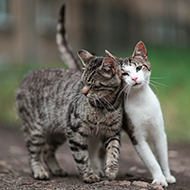Charities marked the ‘landmark’ occasion with a display on Dover's cliffs.
Animal welfare charities have celebrated a ‘landmark’ ban, as new legislation preventing the live export of animals received royal assent.
The law aims to prevent the export of live animals, including cattle, sheep and pigs, for fattening and slaughter from Great Britain.
The Animal Welfare (Live Exports) Act means that animals are slaughtered domestically in slaughterhouses in the UK. Providing transportation is in line with welfare requirements, live exports for breeding and competitions will still be permitted.
No live exports have left the UK since the end of 2020, however this has been due to a lack of border control posts for processing livestock. Campaigners feared that trade could recommence at any time.
Defra says that the new rules represent the UK as a nation of animal lovers, and highlight the UK as a world leader on animal welfare.
Steve Barclay, environment secretary, said: “Our new Act makes use of post-Brexit freedoms to deliver one of our manifesto commitments and strengthen these standards even further by preventing the export of live animals for slaughter and fattening, which we know causes animals unnecessary stress and injury.”
This latest animal welfare legislation forms part of the government’s manifesto, as well as contributing to its commitment to delivering aspects of the Kept Animals Bill individually.
The ban has been welcomed by a number of animal welfare charities, including World Horse Welfare, Compassion in World Farming and RSPCA.
Charities marked the occasion with a projection against the White Cliffs of Dover. The projection, signed by RSPCA, Compassion in World Farming and Kent Action Against Live Exports, reads ‘no more live exports from Great Britain’.
Chris Sherwood, chief executive of the RSPCA, said: “After more than 50 years of campaigning, we are absolutely thrilled to see that live export of animals has been banned from Great Britain.
“This means British animals will no longer be sent on gruelling journeys abroad for further fattening and slaughter in cramped and poor conditions with little or no access to food or water.”
British Veterinary Association president Anna Judson said: “Whilst it’s positive to see a permanent ban on the live export of cattle, sheep, goats, pigs and horses for slaughter and fattening coming into force today, there is still work to be done to ensure the welfare of the animals impacted.
"The new rules focus on journey times and distance travelled, however what is needed is a well-defined set of standards that ensure the welfare needs of the animals being transported are met during the whole journey, no matter the purpose of the travel.”
Image © RSPCA



 International Cat Care (ICatCare) has announced a free, virtual event dedicated to caring for unowned cats to explore new ideas and ways of working.
International Cat Care (ICatCare) has announced a free, virtual event dedicated to caring for unowned cats to explore new ideas and ways of working.